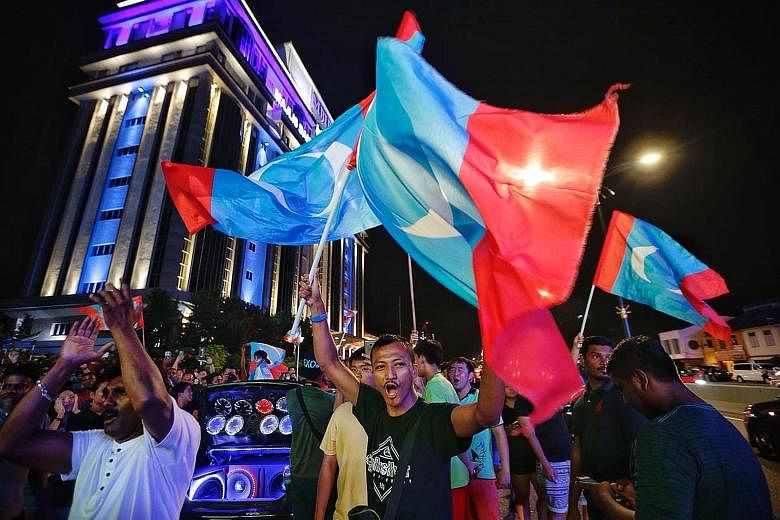Malaysia's one-year-old Pakatan Harapan (PH) government believes it has done plenty for the country's dominant Malay-Muslim community - from spending billions of ringgit to bail out troubled agencies like pilgrimage fund Tabung Haji and land development agency Felda, to cracking down on corruption and recovering embezzled state funds.
Yet these high-level moves have barely registered, especially among rural Malays who struggle with high living costs and fear their ethnic privileges are being eroded.
Many of them had voted for a change of government, believing that the removal of the former administration's goods and services tax (GST) would result in lower prices. But this has not been the case.
Malays make up 74 per cent of the B40 group - the bottom 40 per cent of low-income earners - which comprises families with household incomes below RM4,360 (S$1,430) a month.
A second-generation settler from Felda's Sendayan settlement in Negeri Sembilan, who declined to be named, told The Straits Times: "We haven't got anything that we hoped for. PH promised that fuel prices would go down if they win, but they haven't. They promised that student loan repayments would be deferred, but that didn't happen."
The settler, who works as a building contractor, said his daughter had received an offer to further her studies in Australia, but the government could provide her with only a partial scholarship.
"I can't afford to pay the rest of it so she had to turn it down. I used to support PH but I am angry and disappointed now."
Many rural Malays are feeling the pinch and missing the financial aid provided by the previous Barisan Nasional (BN) government helmed by former premier Najib Razak.
Some of these measures - including cash handouts and medical aid - continue under Prime Minister Mahathir Mohamad, but on a lesser scale as the government tightens its belt.
High government debt - allegedly reaching RM1 trillion - has been blamed on the previous government's practices, including rumoured pilfering of state funds such as 1Malaysia Development Berhad (1MDB), Tabung Haji and Felda.
Najib is facing dozens of criminal charges for corruption and money laundering involving billions allegedly embezzled from 1MDB.
"Before this, if we saw Najib, we would have spat on him. But everything has changed. My friend was so excited the other day to hear that 'Bossku' was coming to visit," said the contractor, referring to Najib's new moniker, which means "my boss".
Many Malays also believe that the PH government is not doing enough to uphold their rights and the status of Islam.
This is a hot-button issue in Malaysia, where Malay Muslims make up 60 per cent of the 32 million-strong population. Out of the 222 parliamentary seats, 117 are Malay-majority wards.
On May 4, about 2,000 protesters marched in central Kuala Lumpur to defend "the sovereignty of Islam" against perceived threats, such as the government's now-retracted decision to accede to the Rome Statute of the International Criminal Court. The treaty was seen as undermining the rights of the country's royal rulers, the traditional protectors of the Malays and Islam.
Other missteps have damaged PH's credibility among Malay voters, including the fake academic qualifications scandal.
Caterer Mohamad Johan Rozaimi, 50, said PH Cabinet ministers have performed dismally, but added that PH has had only a year at the helm.
"BN had been there for 60. So maybe it is unfair to judge them (PH) as having failed. But the Cabinet is weak. I hope it will be reshuffled," he said.
Opposition parties Umno and Parti Islam SeMalaysia have teamed up to exploit the Malay community's disappointment with PH - winning three by-elections.
A recent Merdeka Centre survey showed that approval ratings for Tun Dr Mahathir and PH had plunged; only 24 per cent of Malays polled agreed with the direction the country was taking.
Political science professor Awang Azman Awang Pawi of Universiti Malaya said: "PH needs to stress more on the rights of the Malays... Without the Malay support, the country's political stability will be jeopardised."
Meanwhile, Dr Mahathir's blunt calls for Malays to work harder and not rely on the government's affirmative action policy have only distanced the Malays from PH, said Dr Awang Azman.
He was referring to Dr Mahathir's jibe on May 2 that those who found it too taxing to work the rice fields on a hot day could do so at night instead.
Cutting subsidies should be avoided, Dr Awang Azman added, as it would further burden the rural Malays.
"The people want changes which will impact their daily lives. What is the point of announcing mega projects but the people don't get to enjoy the benefits of development, and the cost of living just increases further?" he said.

